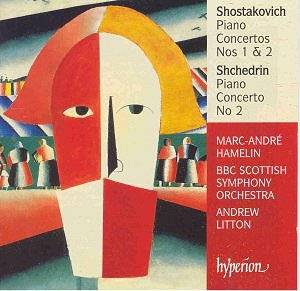While Litton’s Shostakovich
on Dorian and Delos has come in for
critical ‘stick’ his way with the strings
especially in weighting and voicing
moments of trembling expectancy and
loneliness is completely convincing.
Hamelin too approaches this music as
if it is intrinsically of value rather
than an amusing excrescence out of the
main run of the symphonies. This he
does despite Shostakovich’s evident
intentions to entertain and not challenge
unduly. Imagine if there had been a
third concerto written in the mid-1960s
with a surly depressive-introspective
character? It could have happened but
we only have these two concertos which
although having their moments of reflection
seem relaxed beside the quartets and
symphonies and even beside the cello
concertos and violin concertos. They
stand closer to the suites, film scores,
ballets and theatre music - even there
they are not completely birds of a feather.
Hamelin is not content
to leave it there though. In some senses
he and Litton make the two concertos
anew. The First Concerto which
to me has always stood a dismally poor
fourth place to the Second’s first place
is most sensitively imagined. I have
already commented on the snowy remoteness
of the violins in the first movement
but in the second the remote trumpet
croons in a way I have never heard achieved
before. The momentary third movement
makes little impression but the finale
with its Respighian ‘circus ring’ role
for the trumpet is as sprightly and
brisk as you could wish though without
the rough edge of the Previn/Vacchiano
version on Sony. Trumpeter William O’Keeffe
makes an ‘event’ out of his role with
every droop and impudence of his role
savoured. There is nothing at all routine
about this. I dreaded hearing the First
Concerto but actually enjoyed this!
Back onto secure ground
and we come to the Second Concerto.
This work pays its dues to the Soviet-compliant
genre of the life-enhancing ‘Youth’
concerto. Kabalevsky wrote four of these
for the piano. None of those has had
quite the success of the Shostakovich
even if the composer was ‘slumming it’.
In the case of this concerto my reference
is the Sony version directed and played
by Bernstein. I have loved this since
being introduced to the work through
an SBRG prefix CBS LP ‘played to death’
to me at our digs in Bristol in 1971-3.
Here the high excitement of the squealing
Scottish woodwind make something special
of the rattling mettlesome outer movements.
The plangently romantic middle movement
is given a grave rather than sweetened
twist which some may regret. I refuse
to let go of my Bernstein recommendation
but if you want non-pareil sound and
a stunning performance then this is
now the place to go.
Looking back over the
various versions you will find much
to enjoy in the playing of Dimitri Alexeev
(CFP), Marshev (Danacord) and Eugene
List (BMG) and Ortiz (EMI). I have not
heard the versions by Ogdon, Rudy or
Leonskaja although they have been well
received. The composer’s and his son’s
versions are hors de combat and in a
special authoritative category.
Rather than reaching
towards the films to find other Shostakovich
for piano and orchestra Hyperion try
out some Rodion Shchedrin, a
piano pupil of Yakov Flier and composition
student of Yuri Shaporin (come on Hyperion
- how about giving us Shaporin’s 1933
symphony!). There are six piano concertos
the latest of which was played at the
Concertgebouw, Amsterdam in August 2003.
The Second Piano Concerto was
premiered by the composer with Rozhdestvensky
conducting. It was toured throughout
Europe with the Leningrad Phil and Mravinsky
in 1966. This comes as an icy douche
after the two Shostakovich concertos.
The piano seems to move threateningly
closer to the listener.
I reviewed a valuable
though now deleted BMG disc (BMG-Melodiya
74321 36907-2) of the first three Shchedrin
piano concertos in 1998. This involved
the composer as soloist and the USSRSO
conducted by Evgeny Svetlanov. The recordings
were inscribed live at a single concert
on 5 May 1974 at the Grand Hall, of
the Moscow Conservatoire. In 1998 I
described the concerto as ‘densely atonal
but [with] interest … kept alive by
some explosive and seethingly active
textures’. This remains the effect but
now presented to us in the best of digital
sound. Hamelin splashes and smashes
is way through the thickets and surprises
us with the jazzy Lionel Hampton sophistication
of the writing in the finale. The three
movements are Dialogues, Improvisations
and Contrasts.
For a group of Shchedrin
reviews see:-
musicweb\music\classrev\jan99\shchedrin.htm
The only debit with
adding the Shchedrin is the disorientation
a listener who loves the Shostakovich
pair may suffer as a result of the shocking
stylistic gear-change. Going by the
Second Cello Concerto the Shchedrin
is perhaps the way an early 1970s Shostakovich
piano concerto might have sounded if
the genre had not become ‘soiled goods’
to this most fastidious of composers.
The cocktail bar jazz of the last movement
does not however sit well with my supposed
Shostakovich ‘photo-fit’.
Into the bargain Hyperion
have added David Fanning’s expert commentary
rich in incident and allusion and completely
free of the technical obfuscation.
Hyperion may well find
this CD sells just as well as their
Hildegard of Bingen disc. If so I hope
that it augurs well for a series of
Soviet piano concertos. For a start
let’s have the two piano concertos of
Ivan Dzerzhinsky.
Rob Barnett
